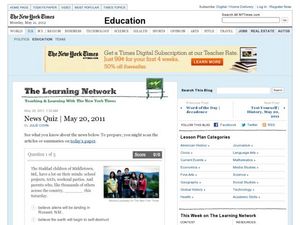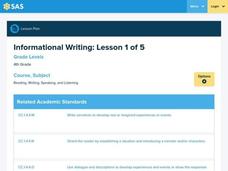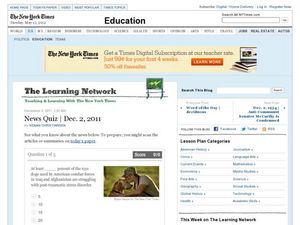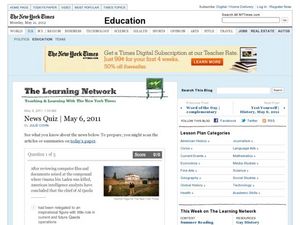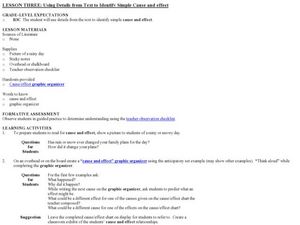Curated OER
Charity Begins at Home
Build stronger informational comprehension in your language arts class. Learners read a 7-paragraph article about charity, then respond to 6 short answer questions. Vocabulary words and definitions are included.
Curated OER
News Quiz | May 20, 2011
Take this daily news quiz to see how informed you are about events that made headlines on May 20, 2011. Check out each of the five questions in the quiz, read or scan the paper to find the answers, and then take the quiz to test your...
Curated OER
News Quiz | May 2, 2012
Information is easy to come by when you have resources like the New York Times. Kids read the Times from May 2, 2012 and then answer a five questions multiple choice quiz.
Polk Bros Foundation
A Way to Analyze Paragraphs to Figure Out the Main Idea of a Nonfiction Text
Shrink up a section by asking pupils to write down the main idea for each of seven paragraphs. There is a space provided for each main idea. When students have completed this portion, they write down what they think to be the central...
Curated OER
Close Reading
Eleventh graders read and study Hamlet. Then they are introduced to close reading as a means of understanding what is being read--not only understanding the printed word, but also the nuances and connotations of language as it is used by...
Pennsylvania Department of Education
Informational Writing
Emerging writers identify an informational piece of writing. They are provided with examples of informational writing and view a PowerPoint on narrative writing. Then, they design their own informational writing with a brochure,...
Curated OER
News Quiz | May 11, 2012
Take a news quiz! Find out how much your learners know about the events of May 11, 2012 according to the New York Times. They read the paper from that day and then take a five questions quiz.
Curated OER
News Quiz | Sept. 30, 2011
World affairs and current events are the name of the game. Today your class can read the Times, published on September 30, 2011 and then take a five question quiz to test their recall abilities.
Curated OER
The Virtuoso Phenomenon
After reading the New York Times article "Virtuosos Becoming a Dime a Dozen," learners answer eight who, what, when, where, and why questions. They post their answers on the New York Times Education Blog. A fun way to get learners...
Curated OER
News Quiz: Dec. 2, 2011
Quiz the class on how much they know about the daily news. They read or scan several New York Times articles published on December 2, 2011, then answer each of the five related multiple choice questions.
Curated OER
News Quiz | May 13, 2011
Help your class get familiarized with the in's and out's of the daily paper. They read a copy of the New York Times from May 13, 2011 and then take a five-question multiple choice quiz.
Curated OER
News Quiz | May 6, 2011
News Quizzes can be a fun way for learners to test their own knowledge. They read the Times published on May 6, 2011 and then take a five question online quiz. This quiz can also be printed.
Curated OER
News Quiz | June 7, 2011
Kids catch up on world affairs. They read an online copy of the New York Times from June 7, 2011. They then take a five question quiz related to that day's top stories.
Curated OER
News Quiz | May 19, 2011
What was happening in the news on May 19, 2011? Find out about the events that made the papers by reading the New York Times. After a quick glance at the paper take an online quiz to see how much you know.
Curated OER
News Quiz | Oct. 14, 2011
When someone asks your class what events were featured in the Times on October 14, 2011, they'll have an answer. They read the paper from that day, then take a five question multiple choice quiz.
Curated OER
NEws Quiz | April 5, 2012
April 5, 2012 is the date of this online copy of the New York Times. Your class will read or scan the paper and then take a five question multiple choice quiz on what they've learned.
Curated OER
News Quiz | Feb. 8, 2012
Take time to check the our the daily news. Learners read a copy of the Times published on February 8, 2012 and then take a five question quiz. A great way to introduce the daily paper to your class.
Curated OER
Reading Log
Are learners keeping up with their independent reading? After finishing a book, individuals record the title of the book, the author, the number of pages read, the date finished, and any comments they have on the text. The reading log...
Curated OER
Lesson Three: Using Details from Text to Identify Simple Cause and Effect
Third graders identify cause and effect. In this cause and effect lesson, 3rd graders use a graphic organizer to predict effects for certain causes. They read a non-fiction text and put sticky notes marking causes and effects.
Curated OER
Farewell to Manzanar
Examine human resilience across two texts with a detailed unit. Over the course of a week, learners will conduct a close reading of excerpts from Unbroken and Farewell to Manzanar. The resource includes clear procedures for reading and...
Curated OER
Short and Sweet Science
Readers learn how to summarize scientific text and evaluate the advantages, disadvantages, and challenges in writing summaries. They select science-related articles you've pulled and collected from the New York Times and, with a partner,...
Core Knowledge Foundation
Unit 4: The Renaissance
The Renaissance is the theme of a five-week unit designed to boost reading comprehension, spelling, vocabulary, and expository writing skills. Scholars listen to and discuss daily readings and engage in skills practice activities...
Core Knowledge Foundation
Unit 6: American Revolution
The American Revolution is the theme of a five-week unit that focuses on reading, grammar, morphology, and writing. Scholars read and respond to texts, practice spelling and word work, and write paragraphs. Assessments gauge comprehension.
Core Knowledge Foundation
Unit 2: Early American Civilizations
Fifth graders explore early American civilizations in a four-week ELA unit. Every lesson offers an opportunity to read and discuss a selected passage followed by word work that covers vocabulary, grammar, and morphology. Learners write...



